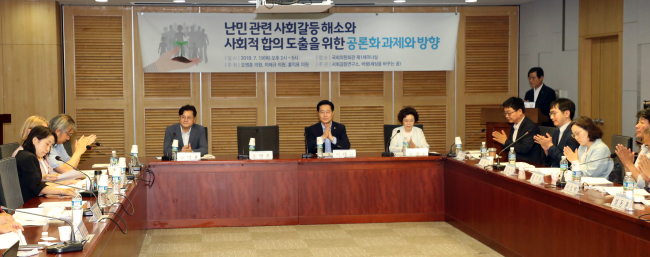People’s anger on social issue directed to asylum seekers: experts
By Jo He-rimPublished : July 19, 2018 - 19:24
The hostile sentiment against asylum seekers in South Korea has grown because public anger about other unresolved social problems is being directed at the foreigners, experts said Thursday.
At a parliamentary seminar on how to deal with the influx of refugees on Jeju, Lee Il, a lawyer from Advocates for Public Interest Law, claimed the social anxiety caused by issues such as low unemployment rates and sex crimes have been directed toward asylum seekers -- minorities and strangers in society.
At a parliamentary seminar on how to deal with the influx of refugees on Jeju, Lee Il, a lawyer from Advocates for Public Interest Law, claimed the social anxiety caused by issues such as low unemployment rates and sex crimes have been directed toward asylum seekers -- minorities and strangers in society.

The seminar titled, “Ways to resolve social conflict regarding refugees,” was organized as the recent refugee issue raised by entry of some 500 Yemeni refugees into the country through Jeju Island’s visa waiver program. The seminar was hosted by Reps. Oh Young-hun and Hong Ihk-pyo of Democratic Party of Korea and Lee Tae-kyu of Bareunmirae Party, at the National Assembly.
“Claims such as that the rise in crime rates caused by the foreigners, and loss of job opportunities for Korean nationals due to their influx are all based on the problems that already exist in Korean society,” Lee said.
For example, sex crimes and gender issues have framed and highlighted the Yemeni asylum seekers issue as “Muslims” and “men,” inciting fear that they are potential sexual criminals or terrorists, Lee explained.
Kim Hyun-mee, cultural anthropology professor from Yonsei University, claimed that that the current reactions of South Koreans opposed to accepting refugees reflects a kind of “neo-racism.”
“Times have changed, but the sense of difference is hard to overcome. So nowadays people refrain from expressing discriminatory statements regarding skin color and enthnicity, but point to cultural or religious differences to distance themselves from foreigners and asylum seekers,” Kim said.
However, some also argued that the fear of refugees and asylum seekers is basically an instinctive fear of the unknown, and that it was wrong to describe the current situation with terms such as xenophobia and Islamophobia.
“News reports and people are often seen using such terms, sending wrong ideas. For such phobias to occur, we would need a much greater number of asylum seekers residing here for a longer period of time,” Seol Dong-hoon a sociology professor at Chonbuk National University said.
“We have had migrant workers from Islamic countries for years and it has not been a problem before. (The influx of Yemeni asylum seekers) is an unprecedented situation, and it is important to resolve conflicts in a timely manner.”
According to a local poll by Gallup Korea released last week, 62 percent of 1,002 respondents said the country should accept minimum number of refugees, while 11 percent said it should accept as many asylum seekers as refugees as possible. Among the respondents, 20 percent said the asylum seekers should be deported immediately.
By Jo He-rim (herim@heraldcorp.com)


















![[KH Explains] Hyundai's full hybrid edge to pay off amid slow transition to pure EVs](http://res.heraldm.com/phpwas/restmb_idxmake.php?idx=652&simg=/content/image/2024/04/18/20240418050645_0.jpg&u=20240419100350)

![[Today’s K-pop] Zico drops snippet of collaboration with Jennie](http://res.heraldm.com/phpwas/restmb_idxmake.php?idx=642&simg=/content/image/2024/04/18/20240418050702_0.jpg&u=)